ACC506 ATMC Semester 1 2019: Chalkboard Supplies Financial Report
VerifiedAdded on 2023/04/04
|9
|1244
|128
Report
AI Summary
This report provides a comprehensive financial analysis of Chalkboard Supplies, focusing on its income statement and balance sheet as of June 31st, 2018. The analysis reveals a net loss of $44,186.6, attributed to high cost of goods sold, significant depreciation expenses, and financial leverage. The report suggests strategies to improve financial performance, including cost reduction, revenue enhancement through in-house manufacturing, and a shift towards long-term liability management. It also discusses depreciation and inventory methods, recommending the straight-line depreciation method and the FIFO inventory system. Furthermore, the report emphasizes the importance of internal control mechanisms, such as secure passwords, regular audits, and cash controls, to safeguard assets and ensure financial integrity. Desklib provides solved assignments and past papers for students.
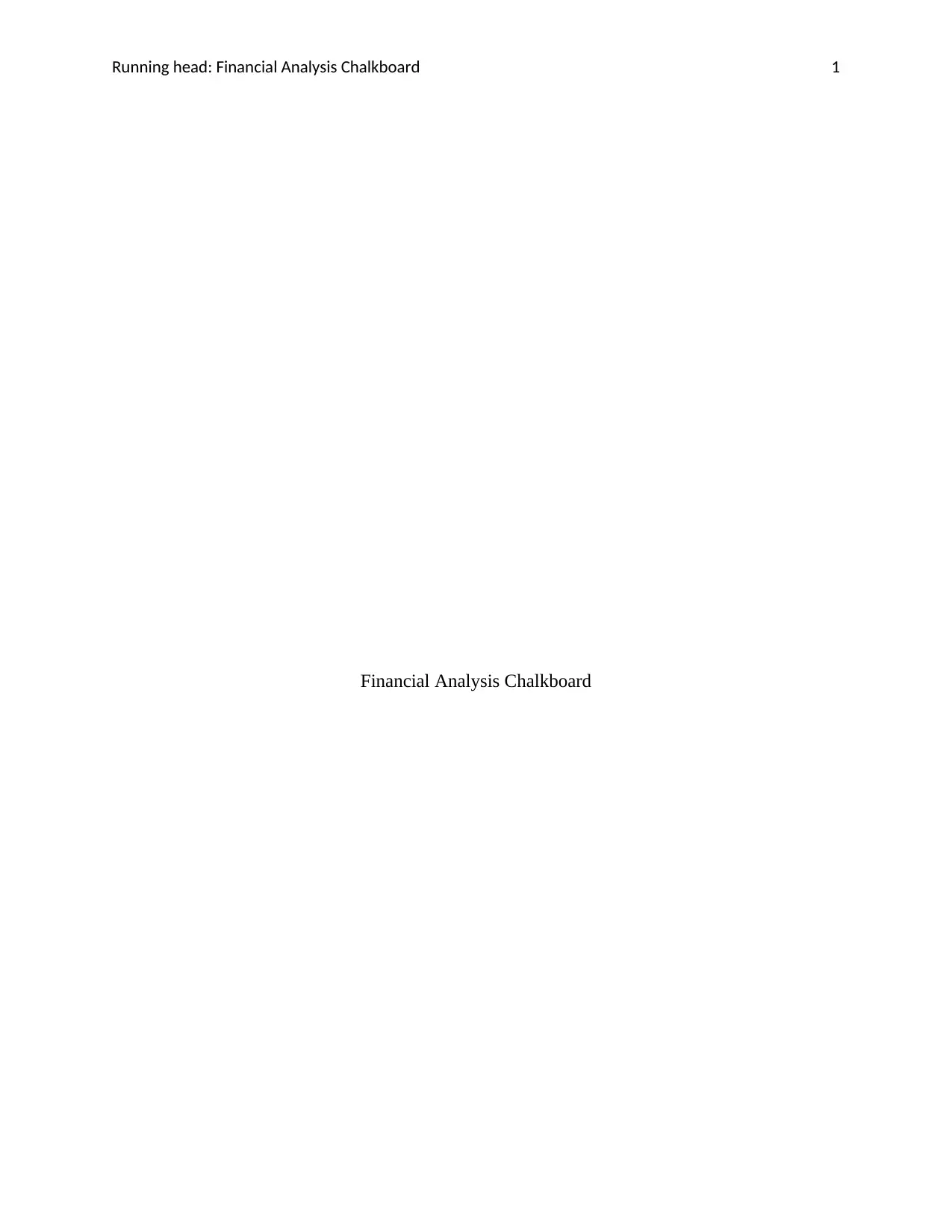
Running head: Financial Analysis Chalkboard 1
Financial Analysis Chalkboard
Financial Analysis Chalkboard
Paraphrase This Document
Need a fresh take? Get an instant paraphrase of this document with our AI Paraphraser
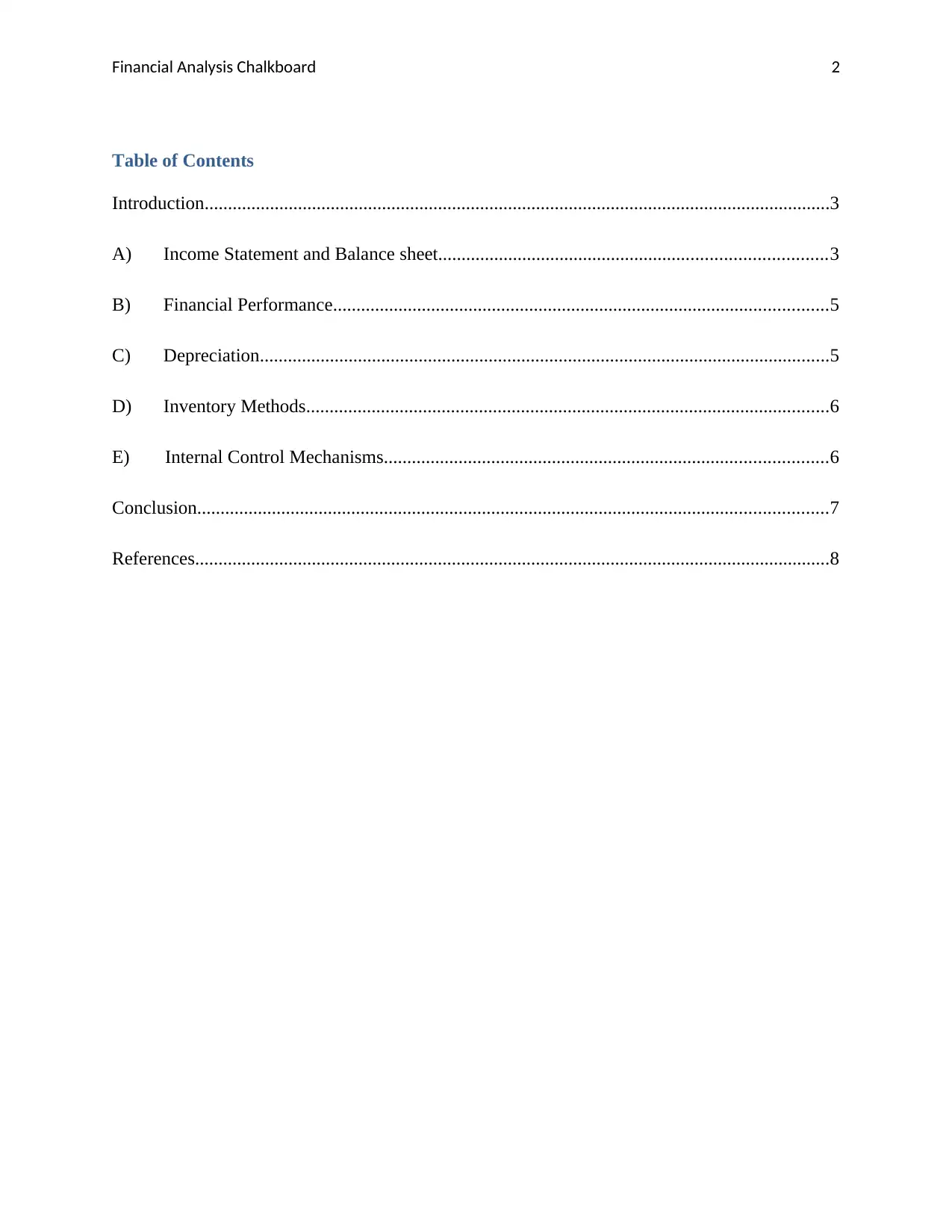
Financial Analysis Chalkboard 2
Table of Contents
Introduction......................................................................................................................................3
A) Income Statement and Balance sheet...................................................................................3
B) Financial Performance..........................................................................................................5
C) Depreciation..........................................................................................................................5
D) Inventory Methods................................................................................................................6
E) Internal Control Mechanisms...............................................................................................6
Conclusion.......................................................................................................................................7
References........................................................................................................................................8
Table of Contents
Introduction......................................................................................................................................3
A) Income Statement and Balance sheet...................................................................................3
B) Financial Performance..........................................................................................................5
C) Depreciation..........................................................................................................................5
D) Inventory Methods................................................................................................................6
E) Internal Control Mechanisms...............................................................................................6
Conclusion.......................................................................................................................................7
References........................................................................................................................................8
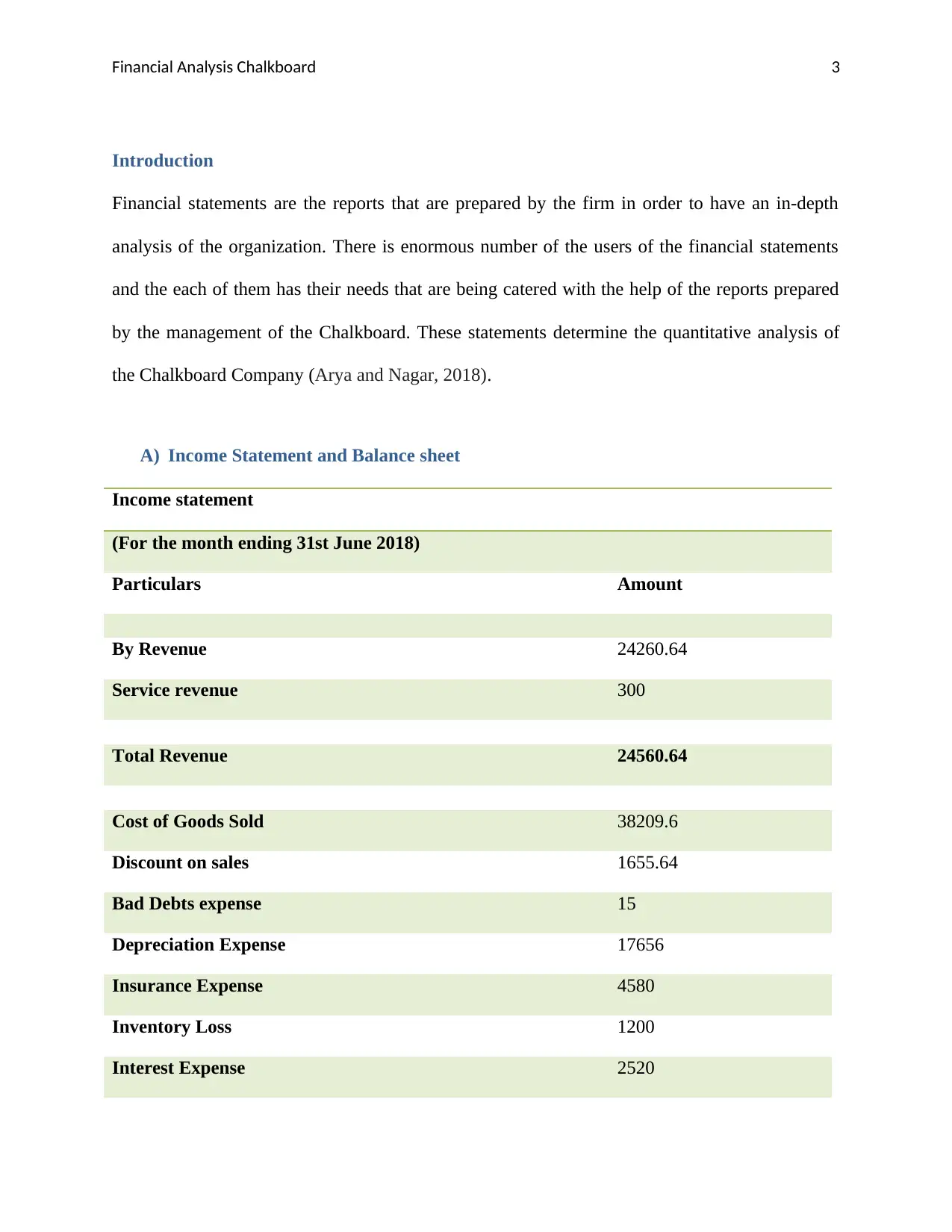
Financial Analysis Chalkboard 3
Introduction
Financial statements are the reports that are prepared by the firm in order to have an in-depth
analysis of the organization. There is enormous number of the users of the financial statements
and the each of them has their needs that are being catered with the help of the reports prepared
by the management of the Chalkboard. These statements determine the quantitative analysis of
the Chalkboard Company (Arya and Nagar, 2018).
A) Income Statement and Balance sheet
Income statement
(For the month ending 31st June 2018)
Particulars Amount
By Revenue 24260.64
Service revenue 300
Total Revenue 24560.64
Cost of Goods Sold 38209.6
Discount on sales 1655.64
Bad Debts expense 15
Depreciation Expense 17656
Insurance Expense 4580
Inventory Loss 1200
Interest Expense 2520
Introduction
Financial statements are the reports that are prepared by the firm in order to have an in-depth
analysis of the organization. There is enormous number of the users of the financial statements
and the each of them has their needs that are being catered with the help of the reports prepared
by the management of the Chalkboard. These statements determine the quantitative analysis of
the Chalkboard Company (Arya and Nagar, 2018).
A) Income Statement and Balance sheet
Income statement
(For the month ending 31st June 2018)
Particulars Amount
By Revenue 24260.64
Service revenue 300
Total Revenue 24560.64
Cost of Goods Sold 38209.6
Discount on sales 1655.64
Bad Debts expense 15
Depreciation Expense 17656
Insurance Expense 4580
Inventory Loss 1200
Interest Expense 2520
⊘ This is a preview!⊘
Do you want full access?
Subscribe today to unlock all pages.

Trusted by 1+ million students worldwide
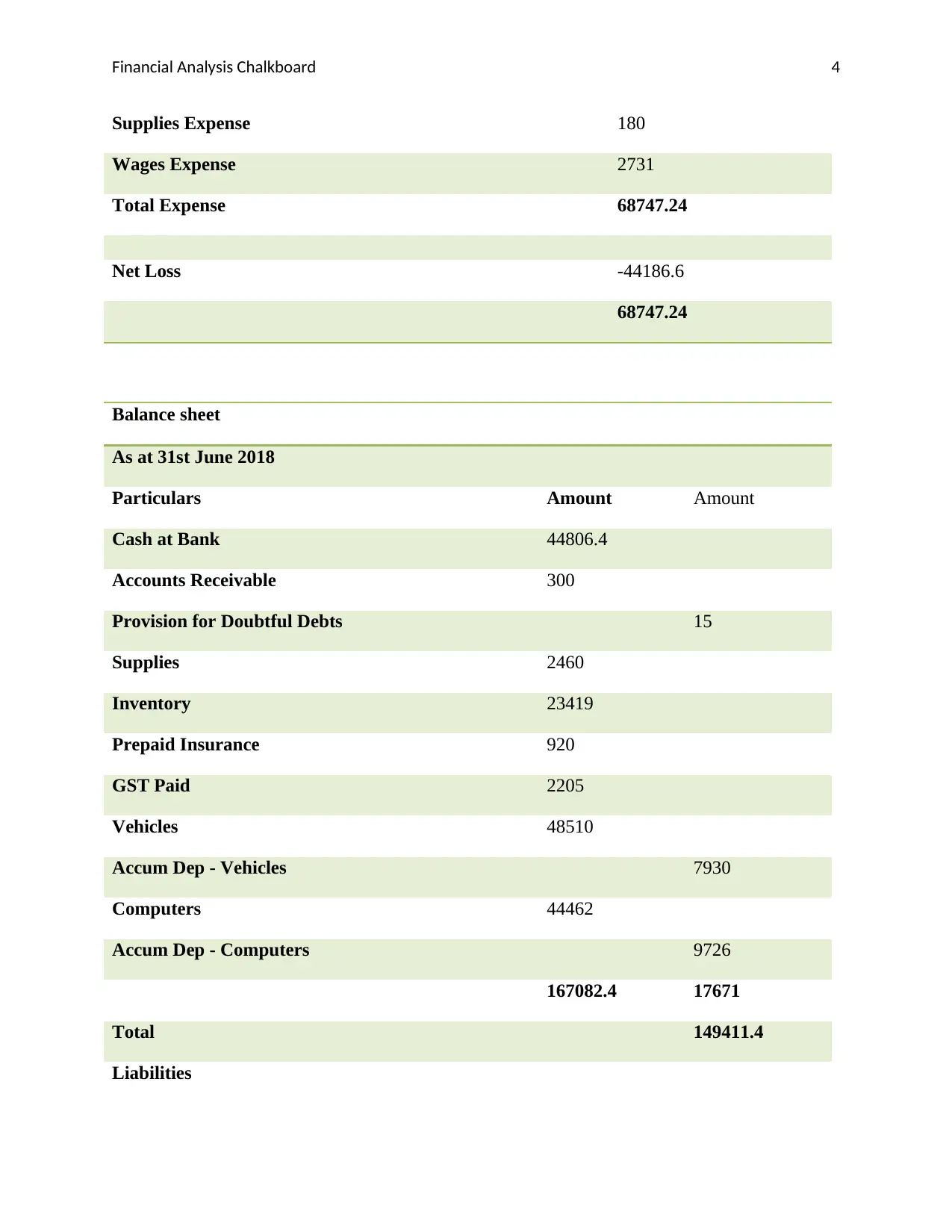
Financial Analysis Chalkboard 4
Supplies Expense 180
Wages Expense 2731
Total Expense 68747.24
Net Loss -44186.6
68747.24
Balance sheet
As at 31st June 2018
Particulars Amount Amount
Cash at Bank 44806.4
Accounts Receivable 300
Provision for Doubtful Debts 15
Supplies 2460
Inventory 23419
Prepaid Insurance 920
GST Paid 2205
Vehicles 48510
Accum Dep - Vehicles 7930
Computers 44462
Accum Dep - Computers 9726
167082.4 17671
Total 149411.4
Liabilities
Supplies Expense 180
Wages Expense 2731
Total Expense 68747.24
Net Loss -44186.6
68747.24
Balance sheet
As at 31st June 2018
Particulars Amount Amount
Cash at Bank 44806.4
Accounts Receivable 300
Provision for Doubtful Debts 15
Supplies 2460
Inventory 23419
Prepaid Insurance 920
GST Paid 2205
Vehicles 48510
Accum Dep - Vehicles 7930
Computers 44462
Accum Dep - Computers 9726
167082.4 17671
Total 149411.4
Liabilities
Paraphrase This Document
Need a fresh take? Get an instant paraphrase of this document with our AI Paraphraser
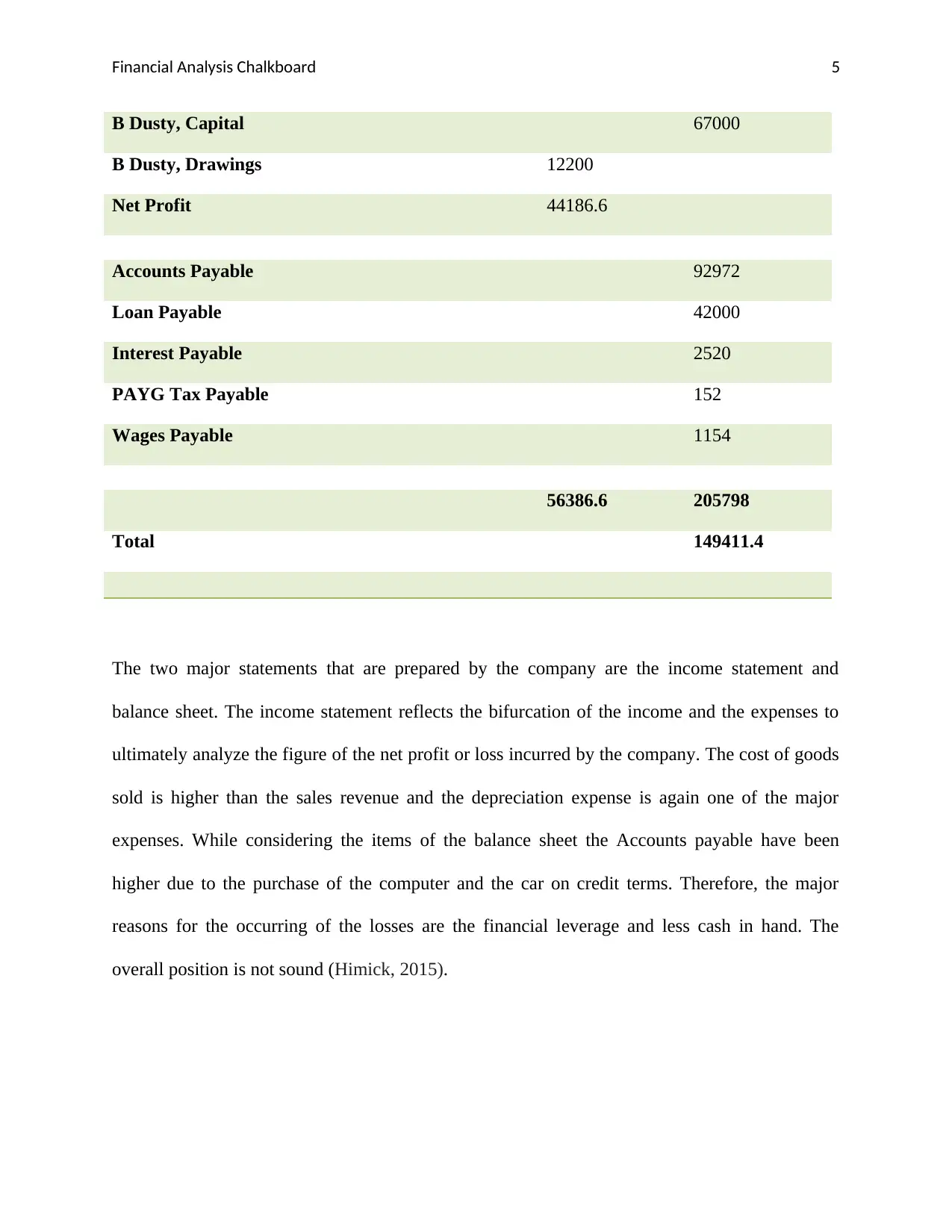
Financial Analysis Chalkboard 5
B Dusty, Capital 67000
B Dusty, Drawings 12200
Net Profit 44186.6
Accounts Payable 92972
Loan Payable 42000
Interest Payable 2520
PAYG Tax Payable 152
Wages Payable 1154
56386.6 205798
Total 149411.4
The two major statements that are prepared by the company are the income statement and
balance sheet. The income statement reflects the bifurcation of the income and the expenses to
ultimately analyze the figure of the net profit or loss incurred by the company. The cost of goods
sold is higher than the sales revenue and the depreciation expense is again one of the major
expenses. While considering the items of the balance sheet the Accounts payable have been
higher due to the purchase of the computer and the car on credit terms. Therefore, the major
reasons for the occurring of the losses are the financial leverage and less cash in hand. The
overall position is not sound (Himick, 2015).
B Dusty, Capital 67000
B Dusty, Drawings 12200
Net Profit 44186.6
Accounts Payable 92972
Loan Payable 42000
Interest Payable 2520
PAYG Tax Payable 152
Wages Payable 1154
56386.6 205798
Total 149411.4
The two major statements that are prepared by the company are the income statement and
balance sheet. The income statement reflects the bifurcation of the income and the expenses to
ultimately analyze the figure of the net profit or loss incurred by the company. The cost of goods
sold is higher than the sales revenue and the depreciation expense is again one of the major
expenses. While considering the items of the balance sheet the Accounts payable have been
higher due to the purchase of the computer and the car on credit terms. Therefore, the major
reasons for the occurring of the losses are the financial leverage and less cash in hand. The
overall position is not sound (Himick, 2015).
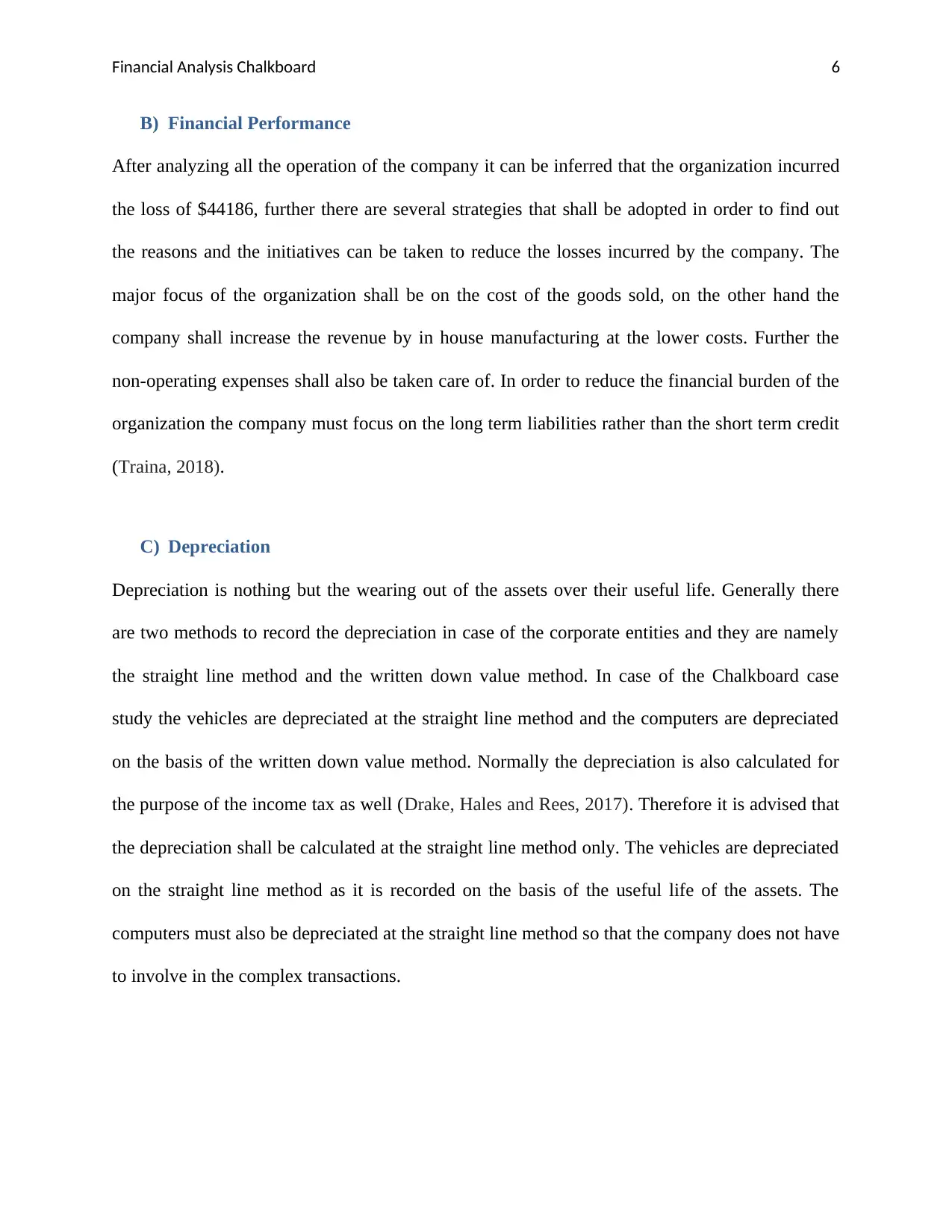
Financial Analysis Chalkboard 6
B) Financial Performance
After analyzing all the operation of the company it can be inferred that the organization incurred
the loss of $44186, further there are several strategies that shall be adopted in order to find out
the reasons and the initiatives can be taken to reduce the losses incurred by the company. The
major focus of the organization shall be on the cost of the goods sold, on the other hand the
company shall increase the revenue by in house manufacturing at the lower costs. Further the
non-operating expenses shall also be taken care of. In order to reduce the financial burden of the
organization the company must focus on the long term liabilities rather than the short term credit
(Traina, 2018).
C) Depreciation
Depreciation is nothing but the wearing out of the assets over their useful life. Generally there
are two methods to record the depreciation in case of the corporate entities and they are namely
the straight line method and the written down value method. In case of the Chalkboard case
study the vehicles are depreciated at the straight line method and the computers are depreciated
on the basis of the written down value method. Normally the depreciation is also calculated for
the purpose of the income tax as well (Drake, Hales and Rees, 2017). Therefore it is advised that
the depreciation shall be calculated at the straight line method only. The vehicles are depreciated
on the straight line method as it is recorded on the basis of the useful life of the assets. The
computers must also be depreciated at the straight line method so that the company does not have
to involve in the complex transactions.
B) Financial Performance
After analyzing all the operation of the company it can be inferred that the organization incurred
the loss of $44186, further there are several strategies that shall be adopted in order to find out
the reasons and the initiatives can be taken to reduce the losses incurred by the company. The
major focus of the organization shall be on the cost of the goods sold, on the other hand the
company shall increase the revenue by in house manufacturing at the lower costs. Further the
non-operating expenses shall also be taken care of. In order to reduce the financial burden of the
organization the company must focus on the long term liabilities rather than the short term credit
(Traina, 2018).
C) Depreciation
Depreciation is nothing but the wearing out of the assets over their useful life. Generally there
are two methods to record the depreciation in case of the corporate entities and they are namely
the straight line method and the written down value method. In case of the Chalkboard case
study the vehicles are depreciated at the straight line method and the computers are depreciated
on the basis of the written down value method. Normally the depreciation is also calculated for
the purpose of the income tax as well (Drake, Hales and Rees, 2017). Therefore it is advised that
the depreciation shall be calculated at the straight line method only. The vehicles are depreciated
on the straight line method as it is recorded on the basis of the useful life of the assets. The
computers must also be depreciated at the straight line method so that the company does not have
to involve in the complex transactions.
⊘ This is a preview!⊘
Do you want full access?
Subscribe today to unlock all pages.

Trusted by 1+ million students worldwide
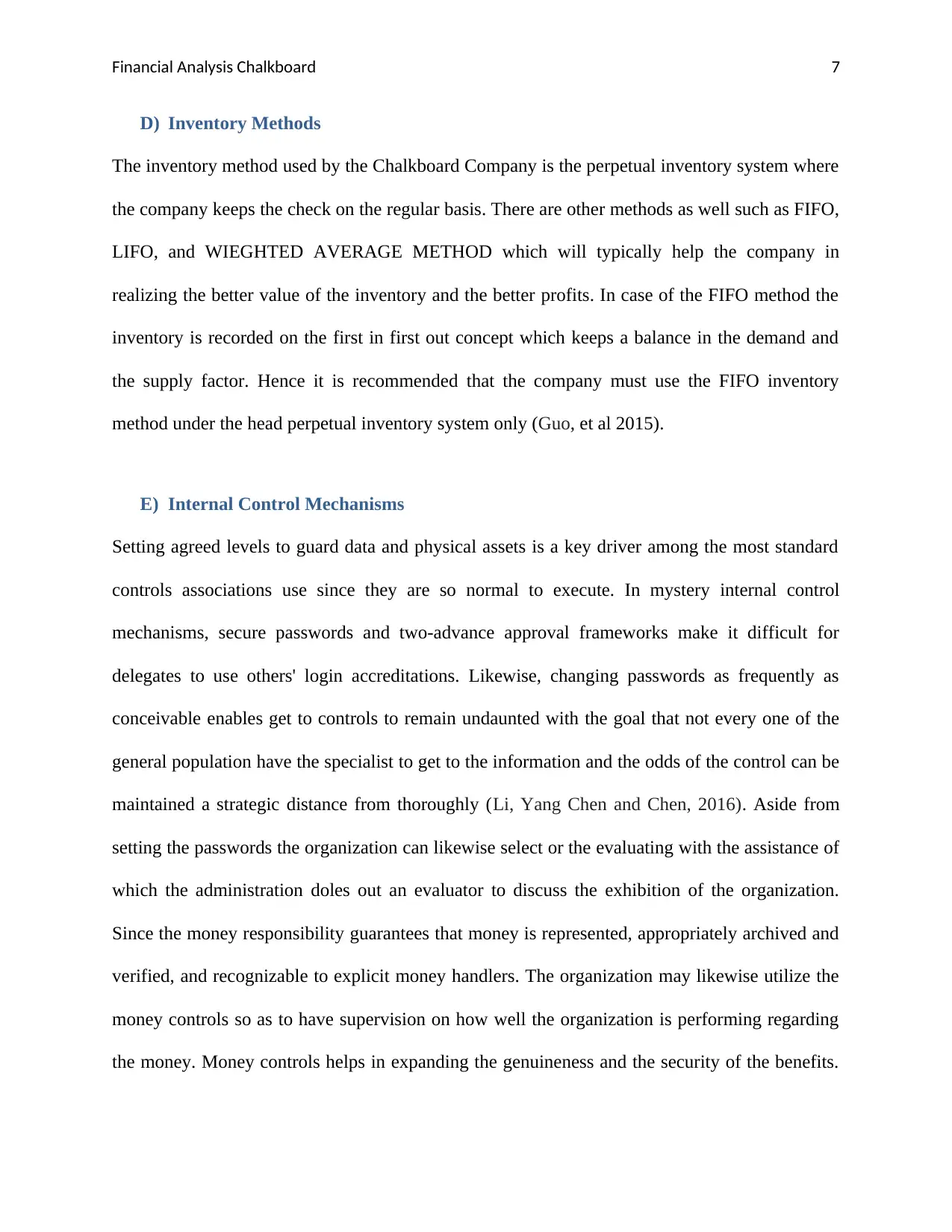
Financial Analysis Chalkboard 7
D) Inventory Methods
The inventory method used by the Chalkboard Company is the perpetual inventory system where
the company keeps the check on the regular basis. There are other methods as well such as FIFO,
LIFO, and WIEGHTED AVERAGE METHOD which will typically help the company in
realizing the better value of the inventory and the better profits. In case of the FIFO method the
inventory is recorded on the first in first out concept which keeps a balance in the demand and
the supply factor. Hence it is recommended that the company must use the FIFO inventory
method under the head perpetual inventory system only (Guo, et al 2015).
E) Internal Control Mechanisms
Setting agreed levels to guard data and physical assets is a key driver among the most standard
controls associations use since they are so normal to execute. In mystery internal control
mechanisms, secure passwords and two-advance approval frameworks make it difficult for
delegates to use others' login accreditations. Likewise, changing passwords as frequently as
conceivable enables get to controls to remain undaunted with the goal that not every one of the
general population have the specialist to get to the information and the odds of the control can be
maintained a strategic distance from thoroughly (Li, Yang Chen and Chen, 2016). Aside from
setting the passwords the organization can likewise select or the evaluating with the assistance of
which the administration doles out an evaluator to discuss the exhibition of the organization.
Since the money responsibility guarantees that money is represented, appropriately archived and
verified, and recognizable to explicit money handlers. The organization may likewise utilize the
money controls so as to have supervision on how well the organization is performing regarding
the money. Money controls helps in expanding the genuineness and the security of the benefits.
D) Inventory Methods
The inventory method used by the Chalkboard Company is the perpetual inventory system where
the company keeps the check on the regular basis. There are other methods as well such as FIFO,
LIFO, and WIEGHTED AVERAGE METHOD which will typically help the company in
realizing the better value of the inventory and the better profits. In case of the FIFO method the
inventory is recorded on the first in first out concept which keeps a balance in the demand and
the supply factor. Hence it is recommended that the company must use the FIFO inventory
method under the head perpetual inventory system only (Guo, et al 2015).
E) Internal Control Mechanisms
Setting agreed levels to guard data and physical assets is a key driver among the most standard
controls associations use since they are so normal to execute. In mystery internal control
mechanisms, secure passwords and two-advance approval frameworks make it difficult for
delegates to use others' login accreditations. Likewise, changing passwords as frequently as
conceivable enables get to controls to remain undaunted with the goal that not every one of the
general population have the specialist to get to the information and the odds of the control can be
maintained a strategic distance from thoroughly (Li, Yang Chen and Chen, 2016). Aside from
setting the passwords the organization can likewise select or the evaluating with the assistance of
which the administration doles out an evaluator to discuss the exhibition of the organization.
Since the money responsibility guarantees that money is represented, appropriately archived and
verified, and recognizable to explicit money handlers. The organization may likewise utilize the
money controls so as to have supervision on how well the organization is performing regarding
the money. Money controls helps in expanding the genuineness and the security of the benefits.
Paraphrase This Document
Need a fresh take? Get an instant paraphrase of this document with our AI Paraphraser
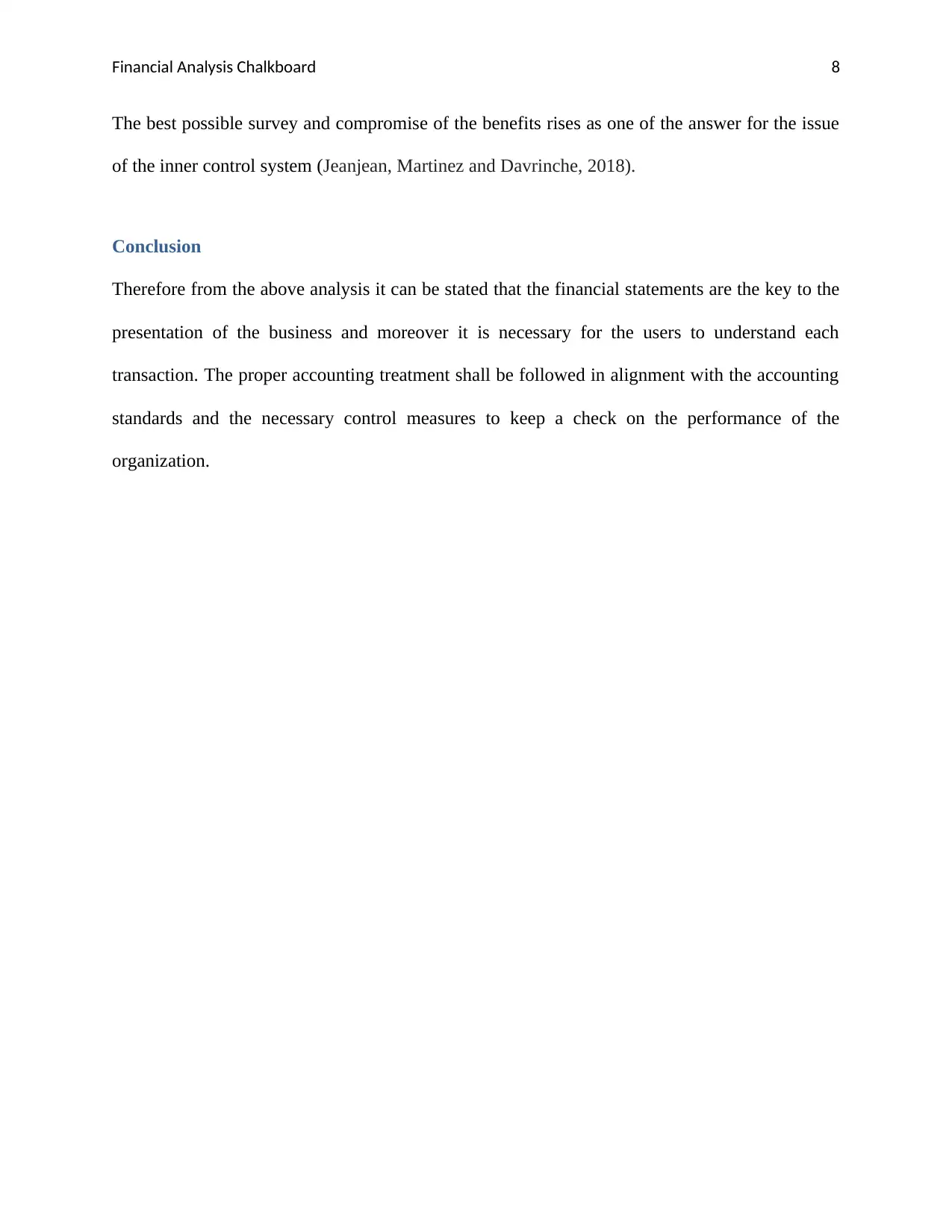
Financial Analysis Chalkboard 8
The best possible survey and compromise of the benefits rises as one of the answer for the issue
of the inner control system (Jeanjean, Martinez and Davrinche, 2018).
Conclusion
Therefore from the above analysis it can be stated that the financial statements are the key to the
presentation of the business and moreover it is necessary for the users to understand each
transaction. The proper accounting treatment shall be followed in alignment with the accounting
standards and the necessary control measures to keep a check on the performance of the
organization.
The best possible survey and compromise of the benefits rises as one of the answer for the issue
of the inner control system (Jeanjean, Martinez and Davrinche, 2018).
Conclusion
Therefore from the above analysis it can be stated that the financial statements are the key to the
presentation of the business and moreover it is necessary for the users to understand each
transaction. The proper accounting treatment shall be followed in alignment with the accounting
standards and the necessary control measures to keep a check on the performance of the
organization.
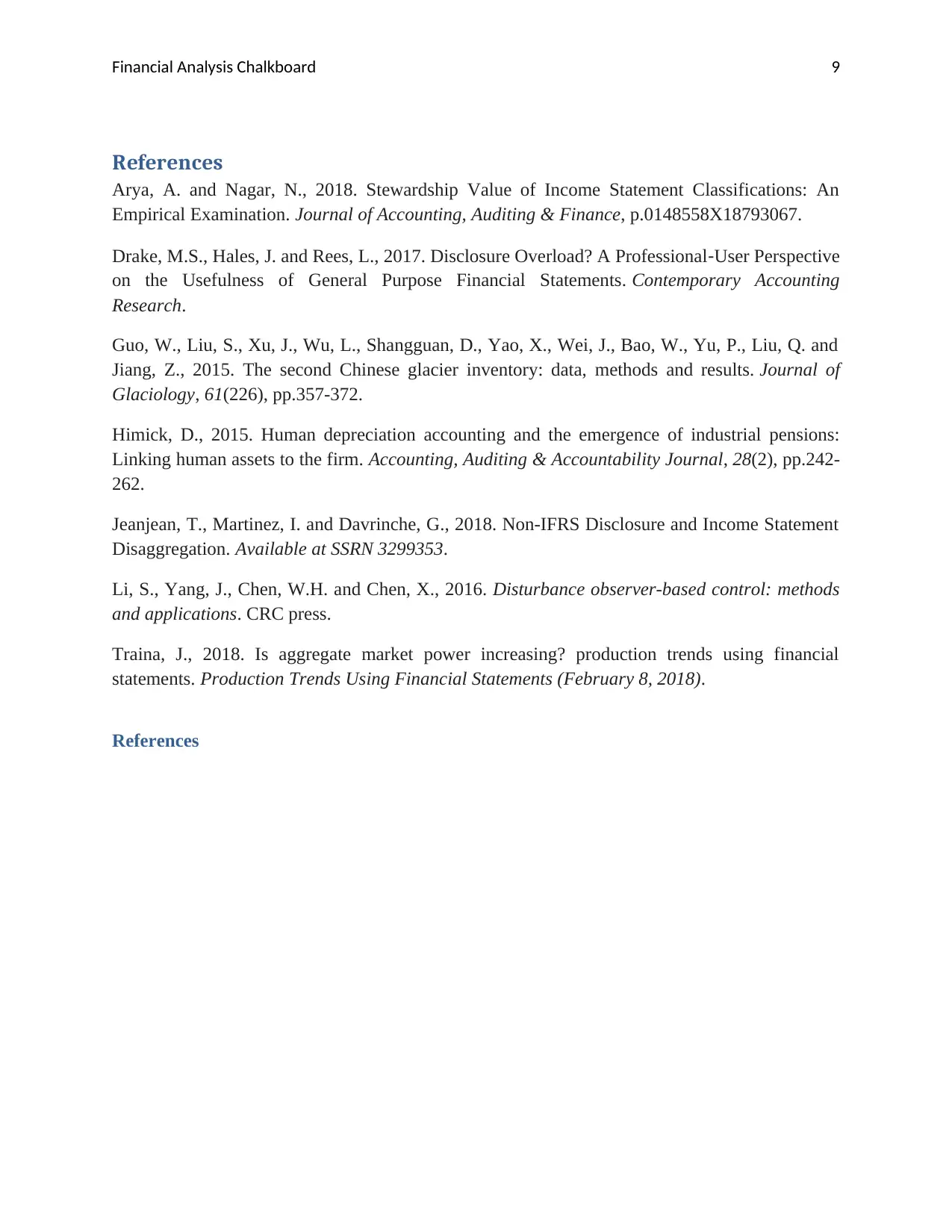
Financial Analysis Chalkboard 9
References
Arya, A. and Nagar, N., 2018. Stewardship Value of Income Statement Classifications: An
Empirical Examination. Journal of Accounting, Auditing & Finance, p.0148558X18793067.
Drake, M.S., Hales, J. and Rees, L., 2017. Disclosure Overload? A Professional‐User Perspective
on the Usefulness of General Purpose Financial Statements. Contemporary Accounting
Research.
Guo, W., Liu, S., Xu, J., Wu, L., Shangguan, D., Yao, X., Wei, J., Bao, W., Yu, P., Liu, Q. and
Jiang, Z., 2015. The second Chinese glacier inventory: data, methods and results. Journal of
Glaciology, 61(226), pp.357-372.
Himick, D., 2015. Human depreciation accounting and the emergence of industrial pensions:
Linking human assets to the firm. Accounting, Auditing & Accountability Journal, 28(2), pp.242-
262.
Jeanjean, T., Martinez, I. and Davrinche, G., 2018. Non-IFRS Disclosure and Income Statement
Disaggregation. Available at SSRN 3299353.
Li, S., Yang, J., Chen, W.H. and Chen, X., 2016. Disturbance observer-based control: methods
and applications. CRC press.
Traina, J., 2018. Is aggregate market power increasing? production trends using financial
statements. Production Trends Using Financial Statements (February 8, 2018).
References
References
Arya, A. and Nagar, N., 2018. Stewardship Value of Income Statement Classifications: An
Empirical Examination. Journal of Accounting, Auditing & Finance, p.0148558X18793067.
Drake, M.S., Hales, J. and Rees, L., 2017. Disclosure Overload? A Professional‐User Perspective
on the Usefulness of General Purpose Financial Statements. Contemporary Accounting
Research.
Guo, W., Liu, S., Xu, J., Wu, L., Shangguan, D., Yao, X., Wei, J., Bao, W., Yu, P., Liu, Q. and
Jiang, Z., 2015. The second Chinese glacier inventory: data, methods and results. Journal of
Glaciology, 61(226), pp.357-372.
Himick, D., 2015. Human depreciation accounting and the emergence of industrial pensions:
Linking human assets to the firm. Accounting, Auditing & Accountability Journal, 28(2), pp.242-
262.
Jeanjean, T., Martinez, I. and Davrinche, G., 2018. Non-IFRS Disclosure and Income Statement
Disaggregation. Available at SSRN 3299353.
Li, S., Yang, J., Chen, W.H. and Chen, X., 2016. Disturbance observer-based control: methods
and applications. CRC press.
Traina, J., 2018. Is aggregate market power increasing? production trends using financial
statements. Production Trends Using Financial Statements (February 8, 2018).
References
⊘ This is a preview!⊘
Do you want full access?
Subscribe today to unlock all pages.

Trusted by 1+ million students worldwide
1 out of 9
Related Documents
Your All-in-One AI-Powered Toolkit for Academic Success.
+13062052269
info@desklib.com
Available 24*7 on WhatsApp / Email
![[object Object]](/_next/static/media/star-bottom.7253800d.svg)
Unlock your academic potential
Copyright © 2020–2026 A2Z Services. All Rights Reserved. Developed and managed by ZUCOL.



